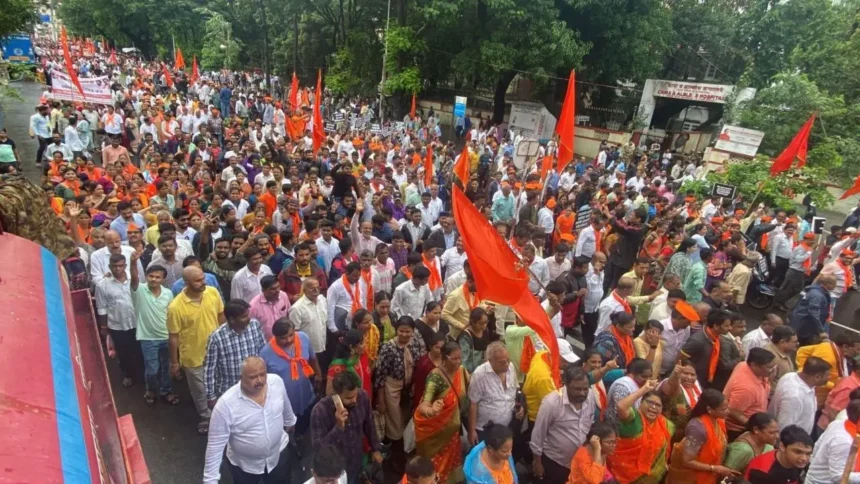In a bold move to address concerns regarding corruption within the Brihanmumbai Municipal Corporation (BMC), Aaditya Thackeray, the leader of Shiv Sena (UBT), spearheaded a march in south Mumbai on Saturday afternoon. The protest, commonly known as a “morcha,” commenced at Metro Cinema and is slated to conclude outside the BMC’s headquarters.
Thackeray’s decision to take a proactive stance against corruption within the BMC signifies the party’s commitment to transparency and good governance. The Shiv Sena (UBT) leader has been a vocal advocate for eradicating corruption and ensuring accountability in public institutions. By leading this march, Thackeray aims to send a strong message to both officials within the BMC and the general public that corruption will not be tolerated.
The BMC, being the governing body responsible for the administration and development of Mumbai, holds significant influence over the city’s infrastructure and welfare. Therefore, any corruption within the organization can have a detrimental impact on the lives of its residents. Thackeray’s march serves as a means to hold the BMC accountable for any mismanagement or unethical practices that may have occurred over the past year.
The decision to commence the march at Metro Cinema holds symbolic significance. Metro Cinema, a cultural landmark in Mumbai, has witnessed the transformation and growth of the city over the years. By starting the march from this iconic location, Thackeray aims to invoke a sense of nostalgia and unity among the participants, reminding them of Mumbai’s heritage and the need to protect it from corruption.
As the march progresses towards the BMC headquarters, Thackeray is expected to address the crowd, highlighting specific instances of alleged corruption and calling for swift action. This public demonstration not only serves as a platform for grievances to be heard but also seeks to put pressure on the BMC to take immediate steps to address these concerns.
The Shiv Sena (UBT) has been a dominant political force in Maharashtra for several decades, advocating for regional issues and espousing Hindutva ideology. With Aaditya Thackeray’s involvement in the protest against corruption, the party aims to strengthen its image as a defender of the common people and their interests.
Corruption has long been a contentious issue in Indian politics, hindering development and eroding public trust. By publicly taking a stand against corruption within the BMC, Thackeray and the Shiv Sena (UBT) are setting an example for other political parties and leaders to follow. This demonstration of accountability and transparency is a step towards restoring faith in public institutions and ensuring the welfare of citizens.
As the march culminates outside the BMC headquarters, the onus now lies on the municipal corporation to address the concerns raised by Thackeray and the participants. Swift action in investigating and rectifying any instances of corruption will be essential to maintain the public’s trust and confidence in the BMC.
The success of this protest will be measured not only by the impact it has on the BMC but also by the broader message it sends to the political landscape of India. By demanding accountability and transparency, Aaditya Thackeray and the Shiv Sena (UBT) strive to create a political environment where corruption is not tolerated, and the interests of the people remain paramount.
The march led by Aaditya Thackeray to protest against corruption in the BMC showcases the Shiv Sena (UBT) party’s commitment to good governance and transparency. By addressing the issue head-on, Thackeray and his supporters aim to foster a culture of accountability and set an example for other political entities. The success of this demonstration will not only depend on the response from the BMC but also on the broader impact it has on




